The_Imperial_Examination_System 中国科举制度 中英文双语
科举制度考试内容
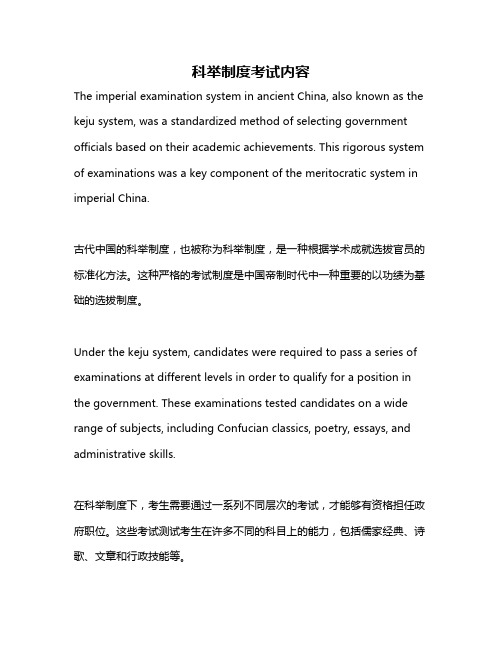
科举制度考试内容The imperial examination system in ancient China, also known as the keju system, was a standardized method of selecting government officials based on their academic achievements. This rigorous system of examinations was a key component of the meritocratic system in imperial China.古代中国的科举制度,也被称为科举制度,是一种根据学术成就选拔官员的标准化方法。
这种严格的考试制度是中国帝制时代中一种重要的以功绩为基础的选拔制度。
Under the keju system, candidates were required to pass a series of examinations at different levels in order to qualify for a position in the government. These examinations tested candidates on a wide range of subjects, including Confucian classics, poetry, essays, and administrative skills.在科举制度下,考生需要通过一系列不同层次的考试,才能够有资格担任政府职位。
这些考试测试考生在许多不同的科目上的能力,包括儒家经典、诗歌、文章和行政技能等。
One of the key features of the keju system was its focus on meritocracy, where individuals were selected for government positions based on their ability and talent rather than their family background or social status. This allowed individuals from all walks of life to have the opportunity to advance in society based on their intellectual capabilities.科举制度的一个关键特点是它着重于以功绩为基础的原则,即个人能力和才华胜任政府职位的被选拔标准,而不是他们的家庭背景或社会地位。
有关科举制的话题作文
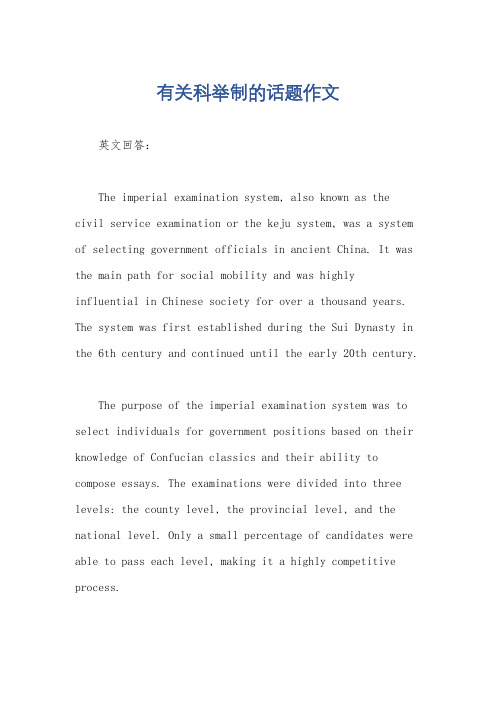
有关科举制的话题作文英文回答:The imperial examination system, also known as thecivil service examination or the keju system, was a system of selecting government officials in ancient China. It was the main path for social mobility and was highlyinfluential in Chinese society for over a thousand years. The system was first established during the Sui Dynasty in the 6th century and continued until the early 20th century.The purpose of the imperial examination system was to select individuals for government positions based on their knowledge of Confucian classics and their ability to compose essays. The examinations were divided into three levels: the county level, the provincial level, and the national level. Only a small percentage of candidates were able to pass each level, making it a highly competitive process.The imperial examination system had both advantages and disadvantages. On one hand, it provided an equal opportunity for individuals from all social classes to pursue a career in government. It allowed talented individuals to rise through the ranks and serve the emperor and the nation. This merit-based system was seen as a fair and just way of selecting officials.On the other hand, the imperial examination system placed a heavy emphasis on rote memorization and adherence to orthodox Confucianism. This limited the diversity of ideas and stifled creativity. The system also favored individuals from wealthy and privileged backgrounds who had access to education and resources. As a result, it perpetuated social inequality and hindered social progress.中文回答:科举制度,又称为文试或者科举制度,是中国古代选拔政府官员的一种制度。
英语四级翻译真题-科举制
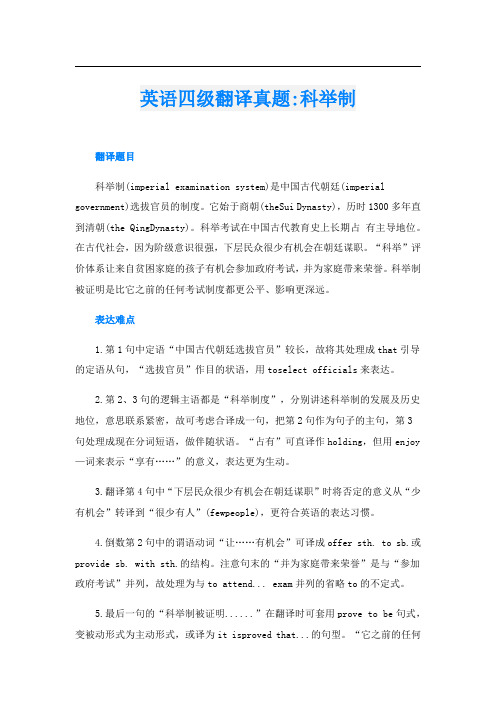
英语四级翻译真题:科举制翻译题目科举制(imperial examination system)是中国古代朝廷(imperial government)选拔官员的制度。
它始于商朝(theSui Dynasty),历时1300多年直到清朝(the QingDynasty)。
科举考试在中国古代教育史上长期占有主导地位。
在古代社会,因为阶级意识很强,下层民众很少有机会在朝廷谋职。
“科举”评价体系让来自贫困家庭的孩子有机会参加政府考试,并为家庭带来荣誉。
科举制被证明是比它之前的任何考试制度都更公平、影响更深远。
表达难点1.第1句中定语“中国古代朝廷选拔官员”较长,故将其处理成that引导的定语从句,“选拔官员”作目的状语,用toselect officials来表达。
2.第2、3句的逻辑主语都是“科举制度”,分别讲述科举制的发展及历史地位,意思联系紧密,故可考虑合译成一句,把第2句作为句子的主句,第3句处理成现在分词短语,做伴随状语。
“占有”可直译作holding,但用enjoy —词来表示“享有……”的意义,表达更为生动。
3.翻译第4句中“下层民众很少有机会在朝廷谋职”时将否定的意义从“少有机会”转译到“很少有人”(fewpeople),更符合英语的表达习惯。
4.倒数第2句中的谓语动词“让……有机会”可译成offer sth. to sb.或provide sb. with sth.的结构。
注意句末的“并为家庭带来荣誉”是与“参加政府考试”并列,故处理为与to attend... exam并列的省略to的不定式。
5.最后一句的“科举制被证明......”在翻译时可套用prove to be句式,变被动形式为主动形式,或译为it isproved that...的句型。
“它之前的任何考试制度”可直译为any other previous examination system或将“它之前的”处理成“考试制度”的后置定语existing before it。
科举英文详细介绍
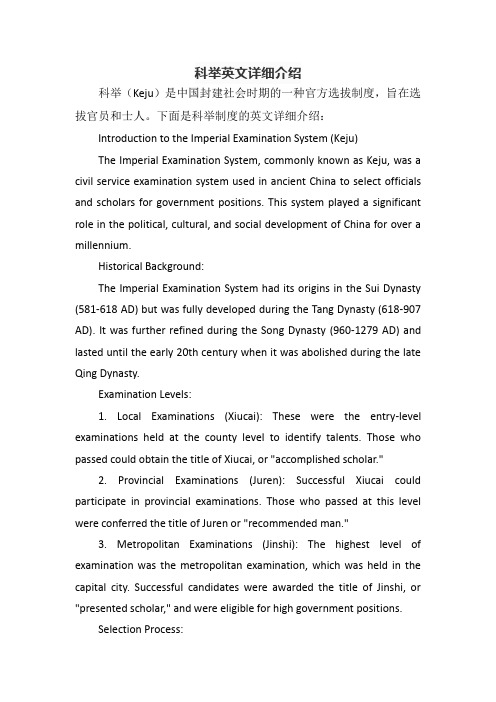
科举英文详细介绍科举(Keju)是中国封建社会时期的一种官方选拔制度,旨在选拔官员和士人。
下面是科举制度的英文详细介绍:Introduction to the Imperial Examination System (Keju)The Imperial Examination System, commonly known as Keju, was a civil service examination system used in ancient China to select officials and scholars for government positions. This system played a significant role in the political, cultural, and social development of China for over a millennium.Historical Background:The Imperial Examination System had its origins in the Sui Dynasty (581-618 AD) but was fully developed during the Tang Dynasty (618-907 AD). It was further refined during the Song Dynasty (960-1279 AD) and lasted until the early 20th century when it was abolished during the late Qing Dynasty.Examination Levels:1. Local Examinations (Xiucai): These were the entry-level examinations held at the county level to identify talents. Those who passed could obtain the title of Xiucai, or "accomplished scholar."2. Provincial Examinations (Juren): Successful Xiucai could participate in provincial examinations. Those who passed at this level were conferred the title of Juren or "recommended man."3. Metropolitan Examinations (Jinshi): The highest level of examination was the metropolitan examination, which was held in the capital city. Successful candidates were awarded the title of Jinshi, or "presented scholar," and were eligible for high government positions.Selection Process:The Imperial Examination System was based on Confucian principles and emphasized knowledge of the Confucian classics. The examinations were highly competitive and required years of rigorous study. Success in these exams offered an opportunity for social mobility and access to prestigious government positions.Impact on Chinese Society:The Keju system had a profound influence on Chinese society and culture. It promoted Confucianism and encouraged education, as aspiring scholars dedicated themselves to rigorous studies. The system also had a stabilizing effect on Chinese society by providing a means for talented individuals from lower social classes to attain positions of influence.Abolition:The Imperial Examination System was abolished in the early 20th century as part of the extensive reforms of the late Qing Dynasty and the subsequent establishment of the Republic of China. The abolition of the system marked a significant turning point in Chinese history, leading to the modernization of education and governance.The Imperial Examination System, or Keju, remains a prominent aspect of Chinese history and serves as a testament to the importance of education and meritocracy in ancient China.。
关于科举的作文800字左右
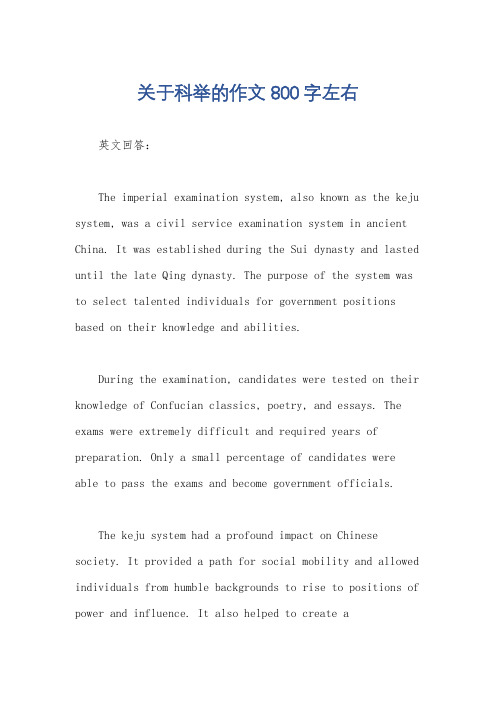
关于科举的作文800字左右英文回答:The imperial examination system, also known as the keju system, was a civil service examination system in ancient China. It was established during the Sui dynasty and lasted until the late Qing dynasty. The purpose of the system was to select talented individuals for government positions based on their knowledge and abilities.During the examination, candidates were tested on their knowledge of Confucian classics, poetry, and essays. The exams were extremely difficult and required years of preparation. Only a small percentage of candidates were able to pass the exams and become government officials.The keju system had a profound impact on Chinese society. It provided a path for social mobility and allowed individuals from humble backgrounds to rise to positions of power and influence. It also helped to create ameritocratic society, where individuals were rewarded based on their abilities rather than their social status.However, the keju system also had its drawbacks. It placed a heavy emphasis on rote memorization and regurgitation of knowledge, rather than critical thinking and creativity. This led to a narrow focus on Confucianism and a neglect of other areas of knowledge and expertise.中文回答:科举制度,又称科举考试制度,是中国古代的一种文职考试制度。
The-Imperial-Examination-System-中国科举制度-中英文双语
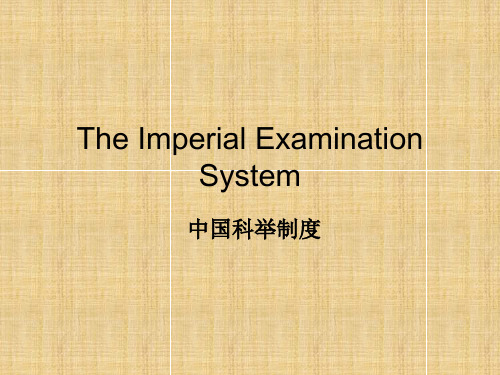
Juren The Provincial Examination
省试
Xiucai
The County Examination 乡试
Tongsheng
Zhuangyuan
Bangyan
Tanhua
Jinshi
Jinshi
Influence Advantages
• To the government • To the administrative officials • To the grassroots
再见
Emperor Taizong
The Four BookS
The Great Learning The Doctrine of the Mean The Analects of Confucius Mencius
the Five Classics
Eight – legged essay
→ → Opening
• 隋朝以后,国家逐渐确立以科举考试选拔 官员,私学开始衰败,调整为以应举(科 举考试)为目的。
Origin ※ To replace the Nine Rank Judging
System (九品中正制) ※ To select real talents
Emperor Yang of Sui
Empexamination System
中国科举制度
Imperial Examination System 科举考试制度
• After the Sui Dynasty, these private and official schools had gradually deteriorated (衰败) into a dependency on the imperial examination system (科 举考试制度), through which officials were selected.
科举制度的意义英语作文
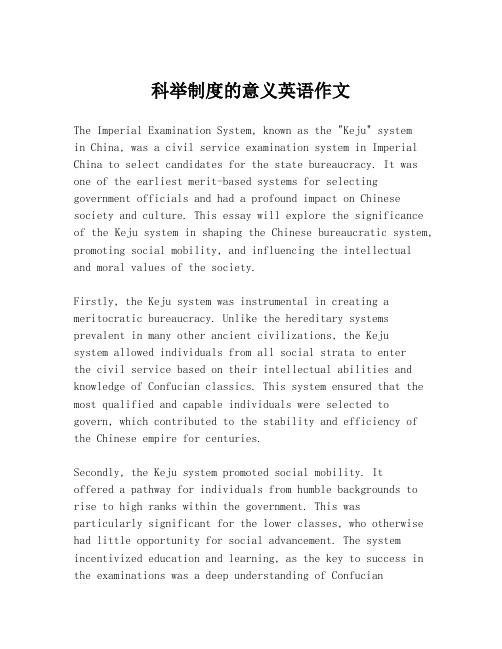
科举制度的意义英语作文The Imperial Examination System, known as the "Keju" systemin China, was a civil service examination system in Imperial China to select candidates for the state bureaucracy. It was one of the earliest merit-based systems for selecting government officials and had a profound impact on Chinese society and culture. This essay will explore the significance of the Keju system in shaping the Chinese bureaucratic system, promoting social mobility, and influencing the intellectual and moral values of the society.Firstly, the Keju system was instrumental in creating a meritocratic bureaucracy. Unlike the hereditary systems prevalent in many other ancient civilizations, the Kejusystem allowed individuals from all social strata to enterthe civil service based on their intellectual abilities and knowledge of Confucian classics. This system ensured that the most qualified and capable individuals were selected to govern, which contributed to the stability and efficiency of the Chinese empire for centuries.Secondly, the Keju system promoted social mobility. Itoffered a pathway for individuals from humble backgrounds to rise to high ranks within the government. This wasparticularly significant for the lower classes, who otherwise had little opportunity for social advancement. The system incentivized education and learning, as the key to success in the examinations was a deep understanding of Confucianphilosophy and literature.Thirdly, the Keju system had a profound effect on the intellectual and moral values of Chinese society. The examinations were designed to test not only the candidates' knowledge but also their moral character and judgment. This emphasis on moral integrity and ethical behavior helped to shape a society that valued virtue and righteousness. The system also fostered a culture of scholarship and respect for education, as success in the examinations was seen as a markof honor and prestige.Moreover, the Keju system had a lasting impact on the Chinese literary and cultural traditions. The examination questions often required candidates to write essays and poems, which contributed to the development of Chinese literature. The system also encouraged the standardization of written Chinese, as candidates needed to be proficient in classical Chinese to succeed in the exams.In conclusion, the Imperial Examination System was a pivotal institution in Chinese history. It represented asophisticated mechanism for selecting government officials based on merit rather than birthright, which was a radical departure from the norms of the time. The system's legacy can be seen in the continued importance of education and thecivil service in modern China, as well as in the enduring influence of Confucian values on Chinese society. The Keju system's emphasis on meritocracy, social mobility, and moral integrity continues to resonate and inspire systems of governance and education around the world.。
大学英语综合教程3课后翻译答案(精美版)
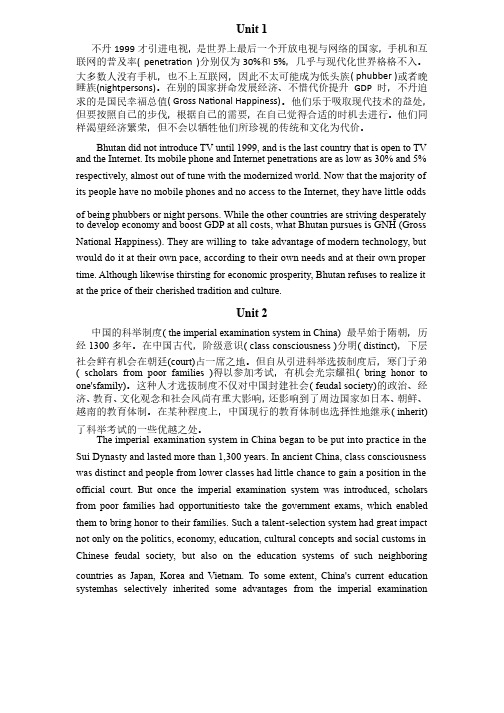
Unit 1不丹1999才引进电视,是世界上最后一个开放电视与网络的国家,手机和互联网的普及率( penetra on )分别仅为30%和5%,几乎与现代化世界格格不入。
大多数人没有手机,也不上互联网,因此不太可能成为低头族( phubber )或者晚睡族(nightpersons)。
在别的国家拼命发展经济、不惜代价提升GDP 时,不丹追求的是国民幸福总值( Gross Na onal Happiness)。
他们乐于吸取现代技术的益处,但要按照自己的步伐,但要按照自己的步伐,根据自己的需要,根据自己的需要,根据自己的需要,在自已觉得合适的时机去进行。
在自已觉得合适的时机去进行。
在自已觉得合适的时机去进行。
他们同他们同样渴望经济繁荣,但不会以牺牲他们所珍视的传统和文化为代价。
样渴望经济繁荣,但不会以牺牲他们所珍视的传统和文化为代价。
Bhutan did not introduce TV until 1999, and is the last country that is open to TV and the Internet. Its mobile phone and Internet penetrations are as low as 30% and 5% respectively, almost out of tune with the modernized world. Now that the majority of its people have no mobile phones and no access to the Internet, they have little odds of being phubbers or night persons. While the other countries are striving desperately to develop economy and boost GDP at all costs, what Bhutan pursues is GNH (Gross National Happiness). They are willing to take advantage of modern technology, but would do it at their own pace, according to their own needs and at their own proper time. Although likewise thirsting for economic prosperity, Bhutan refuses to realize it at the price of their cherished tradition and culture.Unit 2中国的科举制度( the imperial examination system in China) 最早始于隋朝,历经1300多年。
- 1、下载文档前请自行甄别文档内容的完整性,平台不提供额外的编辑、内容补充、找答案等附加服务。
- 2、"仅部分预览"的文档,不可在线预览部分如存在完整性等问题,可反馈申请退款(可完整预览的文档不适用该条件!)。
- 3、如文档侵犯您的权益,请联系客服反馈,我们会尽快为您处理(人工客服工作时间:9:00-18:30)。
Juren The Provincial Examination
省试
Xiucai
The County Examination 乡试
Tongsheng
Zhuangyuan
Bangyan
Tanhua
Jinshi
Jinshi
Influence Advantages
• To the government • To the administrative officials • To the grassroots
Emperor Taizong
The Four BookS
The Great Learning The Doctrine of the Mean The Analects of Confucius Mencius
the Five Classics
Eight – legged essay
→ → Opening
Disadvantages
• Imprison people’ thoughts
十年寒窗无人问, Ten—year hard study by the window, industrious 一举成名天下知。 One—day success known to the world, glorious!
• 隋朝以后,国家逐渐确立以科举考试选拔 官员,私学开始衰败,调整为以应举(科 举考试)为目的。
Origin ※ To replace the Nine Rank Judging
System (九品中正制) ※ To select real talents
Emperor Yang of Sui
Emperor Xuanzong
The Imperial Examination System
中国科举制度
Imperial Examination System 科举考试制度
• After the Sui Dynasty, these private and official schools had gradually deteriorated (衰败) into a dependency on the imperial examination system (科 举考试制度), through which officials were selected.
Amplification
破题
承题
→ Initial argument 起股
Central argument 中股
→ → Latter argument 后股
Final argument 束股
ConcluLeabharlann ion 大结LevelsJinshi The Palace Examination殿试
Gongshi The Academy Examination
